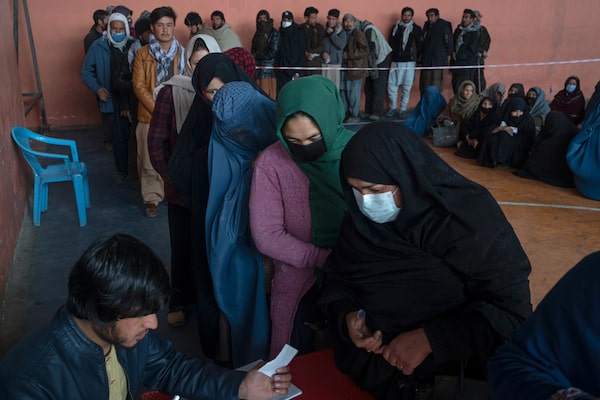
People wait to receive cash at a money distribution organized by the World Food Program in Kabul, Afghanistan, on Nov. 17. With the U.N. warning millions are in near-famine conditions, the WFP has dramatically ramped up direct aid to families.Petros Giannakouris/The Associated Press
In the 100 days since the Taliban seized control of Afghanistan, international aid workers have been racing to feed a starving population.
These humanitarian workers made a critical decision to stay in the country after the U.S. and its allies withdrew their militaries – and much of their diplomatic missions – from the country in August.
They are working to protect gains from the past 20 years – in particular, by pressing the Taliban to have Afghan women continue to work alongside them. All while being among a small international presence in a cash-strapped country.
Sogol Akef, the World Food Programme’s head of engineering in Afghanistan, is from Toronto and has been working in and out of the country for 17 years. Ms. Akef is responsible for overseeing WFP infrastructure, such as offices, accommodation, warehouses and a medical facility. She said that as aid workers, they cannot interrupt their work for anything.
“If we all sort of run away at the first kind of uncertainty or problem, this is just not what the humanitarian person does. You come back, you stay, you deliver,” she said in a phone interview from Kabul.
Afghan ambassador calls for urgent food aid, help to ‘expedite’ refugee exodus
UN seeks $600-million to avert Afghanistan humanitarian crisis
United Nations agencies said in a recent report that more than half of Afghanistan’s population – 22.8 million people – will face extreme hunger over the winter months as the country plunges into a worsening crisis. A collapsing economy, drought and continuing fighting have severely affected access to food. The Taliban’s takeover has had a significant impact on the economy. Civil servants have not been paid in months, the report said.
Taliban control has also meant a freeze of US$9.5-billion in government assets, causing the economy to deteriorate further as well as the value of the currency. Foreign aid had accounted for 40 per cent of Afghanistan’s GDP and its future is uncertain, but some countries continue to provide support through UN agencies and international organizations.
Development aid from the European Union to Afghanistan remains frozen. EU foreign ministers laid out five benchmarks, determining that aid would not continue until they are met. Of particular concern, the EU said in a press release in September, are the rights of women and girls. However, the EU still provides funding through international organizations.
Sogol Akef, World Food Programme’s head of engineering in Afghanistan, is responsible for overseeing WFP infrastructure, such as offices, accommodation, warehouses and a medical facility.World Food Programme/Handout
Ms. Akef said people have been selling their belongings, including furniture and clothes, to put food on the table. Sometimes parents don’t eat so their kids can.
“I have some Afghan friends, or people that I used to work with, and sometimes I see their kids and the kids are telling me, ‘My Dad … the light in his eyes are now gone.’ When a six-year-old child tells you that about their father, that’s heartbreaking.”
Ms. Akef said she was on leave when Kabul fell to the Taliban, but that it was important for her to return to Afghanistan. “I am Canadian. But I come from an immigrant family, my parents are from Iran … so some of this stuff, it’s very personal,” she said.
As chaos unfolded at the Kabul airport in August, with desperate Afghans trying to escape, Mary-Ellen McGroarty, the World Food Programme’s country director, stayed put.
“I think I’m still stunned at how quickly it all happened in terms of how everything changed utterly,” she said. It was terrible, she said, sending local staff home not knowing when she would see them again or what would transpire over the following days.
Ms. McGroarty said now everyone is adjusting to a new reality. Quietly, in the background, she said, there are discussions and negotiations with the Taliban, which she described as not a homogenous group but different from province to province.
She said what she has been telling them is that there is a high proportion of female-headed households in Afghanistan because they are widows and that “if we are to serve them in a dignified and correct manner, then I need female staff to be able to talk to them, because that’s in line with their culture.”
She said that the WFP’s local female staff are are now back at work across the country and that the agency has received co-operation from the Taliban to work independently.
“We don’t want those images of the planes leaving Kabul in August and people hanging off the planes to be the enduring images of Afghanistan. We don’t want the pictures of emaciated and starving children to be the enduring pictures of Afghanistan. The people of Afghanistan deserve more than that from us.”
Mary-Ellen McGroarty, World Food Programme’s country director, speaks to a woman in Afghanistan.World Food Programme/Handout
Guillaume Mongeau-Martin is the medical activity manager for Médecins sans Frontières (Doctors Without Borders) pediatrics in Herat. He is originally from Montreal and has been in the Afghan city for a month.
Dr. Mongeau-Martin supervises the medical activities in MSF’s malnutrition program, which consists of an inpatient therapeutic feeding centre at Herat’s regional hospital. Soon, he said, they will open a pediatric emergency room and intensive-care unit.
He said some patients come from the city of Herat, but many are from communities quite some distance away and it takes a while for them to reach the hospital. This means they often arrive with advanced medical conditions, stemming from malnutrition, that are hard to stabilize.
“You never get fully used to seeing very skinny and fragile children,” he said, adding that the mortality rate is quite high in severe malnutrition cases. “It’s a daily thing we have to face.”
Back in Kabul, Magda Rossmann, Save The Children’s program development and quality director, said her organization provides support for education, treatment for malnutrition, programs for child protection and psychosocial support. It recently started supporting families with cash to help them buy fuel or warm clothes ahead of the winter. It also started handing out blankets.
Ms. Rossmann said to resume these programs, it was necessary to do so with local female staff. “We knew that without female teachers, female doctors, female nurses, social workers, we would not be able to reach women and girls who face a disproportionate impact.”
She had left Afghanistan as part of a regular rest schedule and returned a few weeks ago.
“It’s important that there is pressure and a call to action for the international humanitarian community to provide and release both humanitarian support and some of the longer-term support because we are really concerned about the situation now and especially the crisis with regards to hunger and the upcoming winter.”
Our Morning Update and Evening Update newsletters are written by Globe editors, giving you a concise summary of the day’s most important headlines. Sign up today.
 Janice Dickson
Janice Dickson